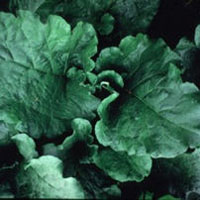Burdock
 © Steven Foster
© Steven FosterParts Used & Where Grown
Burdock is native to Asia and Europe. The root is the primary source of many herbal preparations. The root becomes very soft with chewing and tastes sweet, with a mucilaginous (sticky) texture.
- Reliable and relatively consistent scientific data showing a substantial health benefit.
- Contradictory, insufficient, or preliminary studies suggesting a health benefit or minimal health benefit.
- For an herb, supported by traditional use but minimal or no scientific evidence. For a supplement, little scientific support.
Our proprietary “Star-Rating” system was developed to help you easily understand the amount of scientific support behind each supplement in relation to a specific health condition. While there is no way to predict whether a vitamin, mineral, or herb will successfully treat or prevent associated health conditions, our unique ratings tell you how well these supplements are understood by the medical community, and whether studies have found them to be effective for other people.
For over a decade, our team has combed through thousands of research articles published in reputable journals. To help you make educated decisions, and to better understand controversial or confusing supplements, our medical experts have digested the science into these three easy-to-follow ratings. We hope this provides you with a helpful resource to make informed decisions towards your health and well-being.
This supplement has been used in connection with the following health conditions:
| Used for | Amount | Why |
|---|---|---|
Acne Rosacea | Refer to label instructions | The herb burdock is believed to have a cleansing action when taken internally and has been used historically to treat skin conditions.
|
Acne Vulgaris | Refer to label instructions | Tonic herbs such as burdock are believed to have a cleansing action when taken internally and have been used historically to treat skin conditions. |
Eczema | Refer to label instructions | Burdock has been used historically to treat people with eczema. In traditional herbal texts, burdock root is described as a “blood purifier” or “alterative”4 and was believed to clear the bloodstream of toxins. It was used both internally and externally for eczema and psoriasis, as well as to treat painful joints and as a diuretic. |
Menopause | Refer to label instructions | Burdock is an herb with weak estrogen-like actions similar to soy. In one trial, a formula containing tinctures of licorice, burdock, dong quai, wild yam, and motherwort reduced menopause symptoms. |
Psoriasis | Refer to label instructions | In traditional herbal texts, burdock root was believed to clear the bloodstream of toxins. It was used both internally and externally for psoriasis. |
Rheumatoid Arthritis | Refer to label instructions | Burdock root has been used historically both internally and externally to treat painful joints. |
Traditional Use (May Not Be Supported by Scientific Studies)
In traditional herbal texts, burdock root is described as a “blood purifier” or “alterative”1 and was believed to clear the bloodstream of toxins. It was used both internally and externally for eczema and psoriasis, as well as to treat painful joints and as a diuretic. In Traditional Chinese Medicine, burdock root in combination with other herbs is used to treat sore throats, tonsillitis, colds, and even measles.2 In Japan, it is eaten as a vegetable.
Burdock root has recently become popular as part of a tea to treat cancer. To date, however, research is insufficient to promote burdock for this application.3
Copyright © 2026 TraceGains, Inc. All rights reserved.
Learn more about TraceGains, the company.
The information presented by TraceGains is for informational purposes only. It is based on scientific studies (human, animal, or in vitro), clinical experience, or traditional usage as cited in each article. The results reported may not necessarily occur in all individuals. Self-treatment is not recommended for life-threatening conditions that require medical treatment under a doctor's care. For many of the conditions discussed, treatment with prescription or over the counter medication is also available. Consult your doctor, practitioner, and/or pharmacist for any health problem and before using any supplements or before making any changes in prescribed medications. Information expires December 2026.








